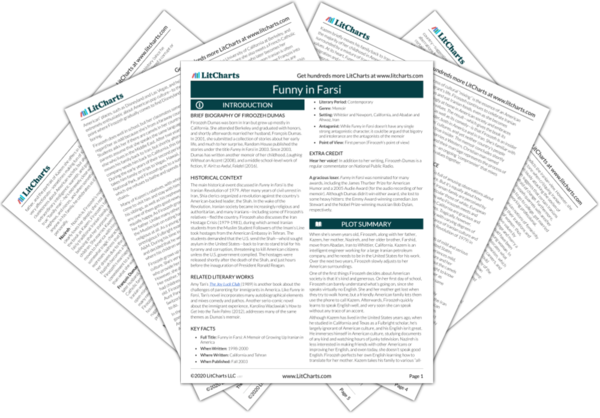Funny in Farsi is a portrait of Iranian immigrant culture, but also a portrait of American values, as seen by Firoozeh over the course of her life in the United States.
For the most part, Firoozeh offers a glowing depiction of American values. She highlights the importance of education in America, and the fact that people of many different backgrounds are encouraged to attend college. Similarly, Firoozeh celebrates the feminist values of American society, which she believes encourage women to pursue their passions, educate themselves, and find work: Firoozeh values this aspect of American society so highly that she says she’s thankful for it at her family’s Thanksgiving feast. Also at the family Thanksgiving feast, Kazem offers another important component of American values: America’s inclusive, accepting nature. For Kazem the best symbol of America’s accepting nature is the institution of voting, which allows adults of any kind to vote for their politicians. Elsewhere in the memoir, Firoozeh writes about other iterations of American inclusiveness and acceptance—for example, the time when she can’t find her way home from school, and a friendly American family lets her into their house and helps her find her way back.
One could easily argue (and plenty of people have) that the virtues of American society Firoozeh discusses have a “dark side”—after all, American society is hardly free from racism, sexism, or xenophobia. However, Firoozeh doesn’t offer any such criticism of American values. To the extent that Firoozeh does criticize American values, she faults America for its crassness, its material excesses, and its overall lack of dignity or seriousness. At several points in her memoir, Firoozeh describes her horror at seeing Americans eating food; similarly, she notes the outrageous excessiveness of American grocery stores, and the amount of food that Americans waste every year. In these and other passages, Firoozeh suggests that American society—and American values, too—encourage an undignified, almost childish amount of greed and wastefulness that would be considered outrageous in almost any other country. However, even when criticizing American excessiveness and tackiness, Firoozeh always softens her criticism. Her own beloved father is guilty of these same faults, suggesting that they’re more like minor flaws than serious problems, and also suggesting that greed isn’t even a uniquely American value. Similarly, when describing the bigotry that her family endures, Firoozeh stresses that the America she knows and loves is tolerant, suggesting that any instances of bigotry are deviations from American values, rather than expressions of those values. In all, Firoozeh paints an extremely warm and loving portrait of American values—one which many (but certainly not all) immigrants would agree with.
American Values ThemeTracker

American Values Quotes in Funny in Farsi
To him, America was a place where anyone, no matter how humble his background, could become an important person. It was a kind and orderly nation full of clean bathrooms, a land where traffic laws were obeyed and where whales jumped through hoops. It was the Promised Land. For me, it was where I could buy more outfits for Barbie.

Unlock explanations and citation info for this and every other Funny in Farsi quote.
Plus so much more...
Get LitCharts A+When my parents and I get together today, we often talk about our first year in America. Even though thirty years have passed, our memories have not faded. We remember the kindness more than ever, knowing that our relatives who immigrated to this country after the Iranian Revolution did not encounter the same America. They saw Americans who had bumper stickers on their cars that read "Iranians: Go Home" or "We Play Cowboys and Iranians." The Americans they met rarely invited them to their houses. These Americans felt that they knew all about Iran and its people, and they had no questions, just opinions. My relatives did not think Americans were very kind.
Everywhere I went, I saw the same carved coconuts, the same seashell frames, and the same hats, all made in the Philippines. I tried to hang loose, but Waikiki felt more like 7-Eleven-by-the-Sea.
After three months of rejections, I added “Julie” to my résumé. Call it coincidence, but the job offers started coming in. Perhaps it's the same kind of coincidence that keeps African Americans from getting cabs in New York.
During our Thanksgiving meal, my father gives thanks for living in a free country where he can vote. I always share gratitude for being able to pursue my hopes and dreams, despite being female. My relatives and I are proud to be Iranian, but we also give tremendous thanks for our lives in America, a nation where freedom reigns.
It’s not what we eat or don't eat that makes us good people; it's how we treat one another. As you grow older, you'll find that people of every religion think they're the best, but that's not true. There are good and bad people in every religion. Just because someone is Muslim, Jewish, or Christian doesn't mean a thing.
He also had a new dream, in which the treasure was no longer buried. He dreamed that someday, he would return to America with his own children. And they, the children of an engineer from Abadan, would have access to the same educational opportunities as anybody else, even the sons of senators and the rich.
I’m a rich man in America, too. I just don't have a lot of money.











